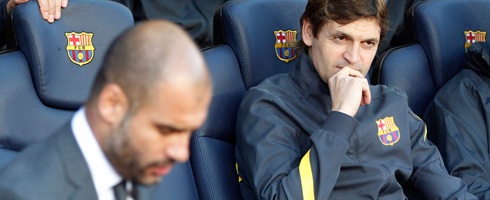It has been a promising start to life in the hotseat for new Barcelona Coach Tito Vilanova. Having worked closely under Pep Guardiola for five years, Vilanova was expected to continue in the same vein in terms of both results and style. After five consecutive League wins – a record in La Liga for a new Coach – the club sits eight points clear of Real Madrid and the 44-year-old has maintained results whilst shifting the style of football.
What has been particularly striking about Barcelona’s football this year has been the emphasis on combining short and long possession. Under Guardiola they played the fewest long balls in the Primera, averaging 54 per game during 2011-12. This season, however, that rate has already increased to 60 long balls per game, including a substantial 69 against Grenada on Saturday. It also places them bang in the middle of the long-ball La Liga table – insofar as that oxymoron exists – with nine teams launching fewer passes over extended distances. Yet, before the embodiment of tiki-taka are redefined as long-ball merchants, it is worth noting that, of the 59 long balls from outfield players on Saturday, 92 per cent reached their target. That is a remarkable display of vision and accuracy that Vilanova believes must be exploited.
One of the key advantages in such an approach is advancing into dangerous areas before the opposition has had time to regroup. The more direct model is likely to bring out the best of Cesc Fabregas whom Vilanova praised as ‘anarchic’. In effect, the Coach lauded his ability to penetrate opposition defences, either through vertical passing or runs from deep.
It is also a means of adding counter-attacking football to Vilanova’s armoury of tactical weapons. Given the reluctance of opposing teams to push forward, it is rare that Barcelona have the chance to break from their own half. Yet with the success of last season’s three other Champions League semi-finalists – Chelsea, Bayern Munich and Real Madrid – in embracing counter-attacking football, means it is important that Vilanova maximises any opportunity Barcelona have of hitting teams on the break.
Other changes from the Guardiola era have been to some extent forced onto the Coach. The introduction of Jordi Alba and return from injury of David Villa has strengthened the club’s left-hand side. As a result, the players have so far proven statistically three times more likely to shoot from the left flank than the right. Meanwhile, injuries to Carles Puyol, Gerard Pique and Dani Alves have seen new signing Alex Song repeat Javier Mascherano’s move into defence. And in a move very much inspired by Guardiola and Marcelo Bielsa, he will likely spend much of his season switching between midfield and the back line.
Yet concerns remain regarding both the shape and composition of the defence under Vilanova. The first-half performance during the defeat to Real Madrid in the Bernabeu was perhaps the leakiest the defence has appeared since the final vestiges of the Frank Rijkaard era. Little wonder that La Blaugrana have only kept two clean sheets in the nine games since Vilanova’s appointment.
Despite Barcelona’s strong start to the campaign, they have also at times still struggled to break down teams, prompting Vilanova to change formation late on in games. He switched to 4-2-4 against Osasuna to salvage three points when trailing 1-0, then a 3-4-3 to overcome both Spartak Moscow and Grenada. Although Guardiola experimented with the latter formation, Vilanova has re-shaped it by overloading the centre of the midfield at the expense of central defenders. The manoeuvres have paid off with 43 per cent of the team’s goals so far having arrived during the last 15 minutes of their matches.
However, Vilanova will want to have games sown up with greater ease if the team are to sustain their winning run in both the Primera Division and Champions League. The introduction of a more mixed style of football has brought diversity but equally has necessitated tactical gambles. Achieving the balance between variety, fluidity and defensive robustness will be the main challenge for Vilanova as he strides out of the shadows cast by Guardiola.

